Redditor's Ex Gets Furious Because She Adopts A New Dog After Giving Him Custody Of Their Old Aggressive Dog
As pet owners, we all cherish the unconditional love we have for our pets. No matter how demanding they can be, a pet owner will always try their best to make them happy and content.
Especially if it's a dog with anxiety issues. Pet owners know their puppy needs them, so they'll search for various treatments and methods to help it feel better.
Unfortunately, sometimes nothing can help. But even then, the dog owner will never give up on them, and they will continue trying until their last hope dies.
A Reddit user shared her story recently. She and her ex-boyfriend had adopted a dog while they were together.
After their breakup, they continued to share custody of the dog. Everything was fine until the dog's anxiety became impossible to control.
This led to the dog biting her, and after that incident, she started to feel unsafe around him. They continued to work with animal behaviorists and trainers, but the dog had other aggressive outbursts afterward.
She told her ex that she would like him to take full custody of their puppy because she no longer feels safe near the dog, and he agreed. However, the problem arose later when she informed her ex that she had decided to adopt a small elderly dog.
Her ex became furious and called her irresponsible and selfish. She began to wonder if his accusations were true.
The original post:

They adopted a dog together and continued to share its custody after the breakup
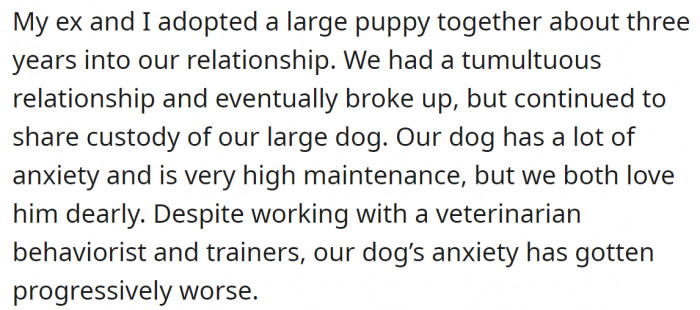
But the dog had anxiety issues that worsened over time and even made him bite her.
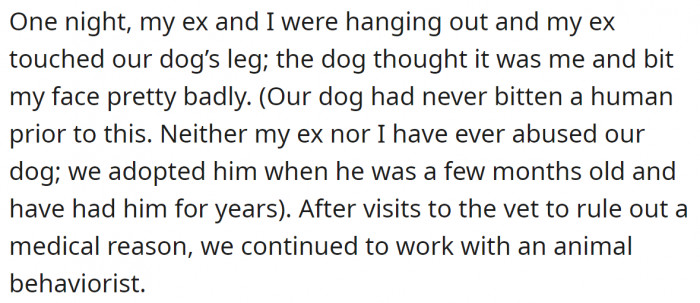
Understanding Emotional Attachments to Pets
This situation reflects the profound emotional attachments that individuals can develop with their pets.
Dr. Rachel Adams, a psychologist specializing in animal-human relationships, notes that pets often serve as sources of comfort and companionship.
Research shows that these bonds can significantly impact emotional well-being, leading to feelings of loss when relationships change.
The Emotional Weight of Pet Custody
The intense emotions surrounding pet custody reflect deeper attachment issues that often arise during relationship separations. Research in attachment theory indicates that pets can serve as significant emotional anchors, complicating decisions about their custody. When one partner struggles to let go, it can evoke feelings of loss similar to those experienced in human relationships.
Studies published in the Journal of Social and Personal Relationships highlight how the bonds formed with pets can mirror those with family members, making custody decisions particularly poignant and emotionally charged.
Unfortunately, no one managed to help the dog, and he had many aggressive outbursts.
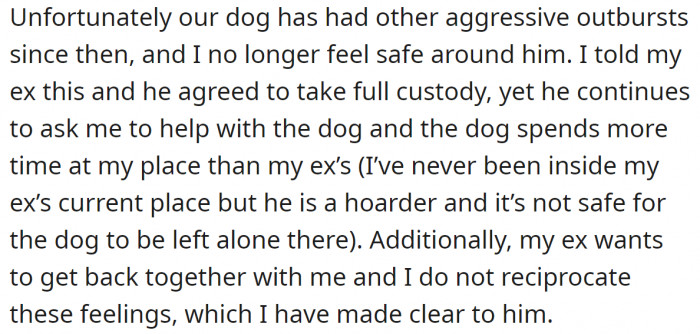
After a while, she decided to adopt a small dog herself, but her ex got mad when he found out since he was taking care of their dog.

"I feel torn up about parting ways with my large dog as I love him dearly, but I live in fear he will bite me again."
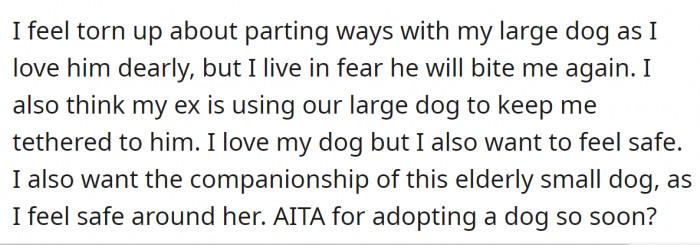
The ex-partner's anger over the adoption of a new dog indicates a struggle with feelings of abandonment or jealousy, which are common in relationship terminations.
Studies in attachment theory suggest that individuals may project their feelings onto pets, viewing them as symbols of past relationships.
Understanding these dynamics can help individuals navigate their emotions in the aftermath of a breakup.
Conflict over pet custody often reveals underlying issues of control and loss. Psychological research indicates that the inability to relinquish control over a beloved pet can lead to heightened anxiety and frustration. In this case, the ex-partner's anger regarding the adoption of a new dog may stem from unresolved feelings of jealousy and abandonment.
Understanding these emotional dynamics can help individuals navigate such conflicts with greater empathy and awareness.
"My ex does not want to rehome our large dog, nor does he believe in behavioral euthanasia."
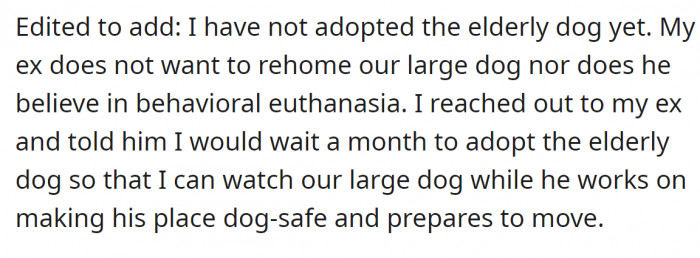
Her ex is definitely using the dog to stay in touch with her.
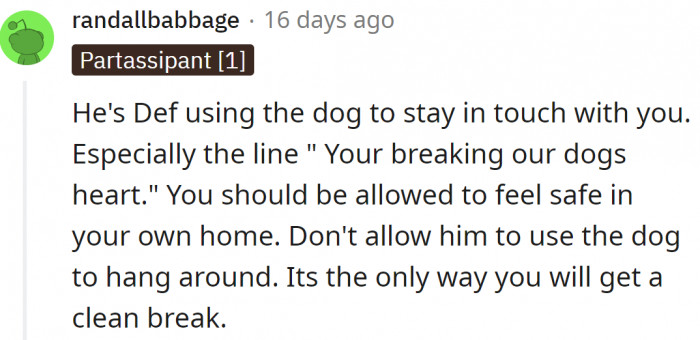
"I'm shocked you didn't have the dog put down."
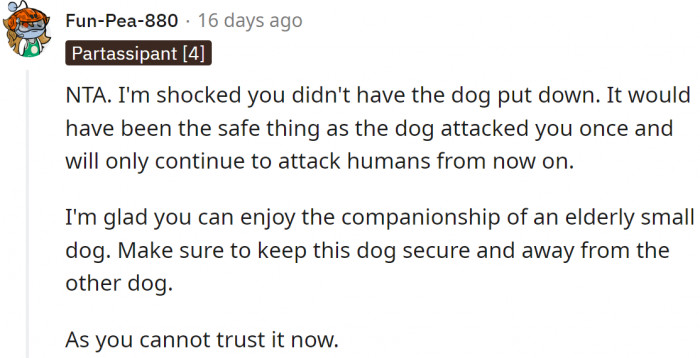
Coping with Loss and Change in Pet Relationships
Processing the loss of a pet or changes in pet ownership can lead to significant emotional distress.
Experts recommend engaging in self-care practices, such as journaling or seeking support from friends, to help process these feelings.
Research indicates that expressing emotions and finding healthy outlets can lead to better emotional regulation and healing.
Coping with Loss and Grief
Grief manifests in various ways, particularly in the context of losing a pet or a relationship. The stages of grief, as outlined by Elizabeth Kübler-Ross, include denial, anger, bargaining, depression, and acceptance. This framework can provide insights into the emotional responses experienced when navigating pet custody disputes.
Understanding these stages can help individuals process their emotions and facilitate healthier conversations about custody arrangements.
If the dog has aggressive tendencies, he needs a much more pleasant environment:
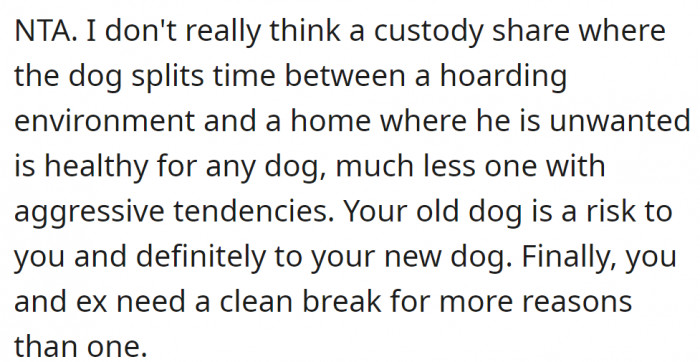
Having to put down a pet is the hardest choice, but she will have to if he continues to act aggressively.
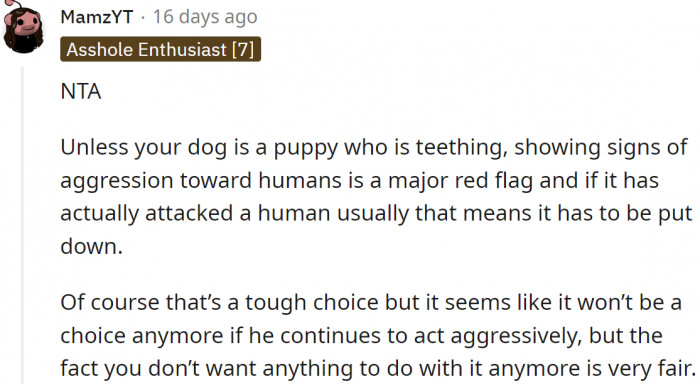
She should try to find a pleasant home for her old dog before she adopts a new one.
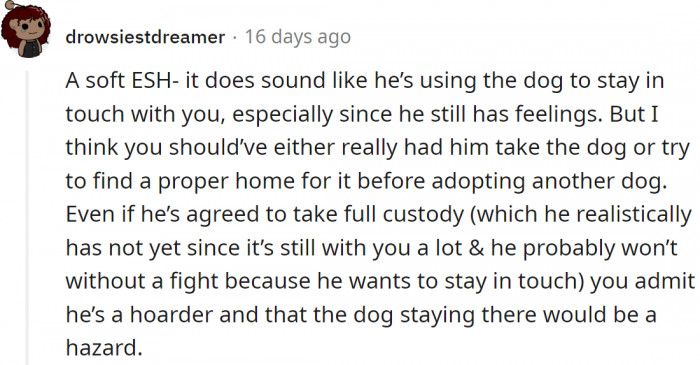
Practical strategies for managing emotional responses include utilizing mindfulness techniques and focusing on the present moment.
Studies suggest that mindfulness can help individuals cope with difficult emotions by fostering acceptance and reducing rumination.
By practicing mindfulness, individuals can better navigate their feelings and reduce the impact of emotional distress.
To address the complexities of pet custody, engaging in open and honest conversations is crucial. Research in conflict resolution suggests that utilizing mediation can help individuals navigate emotional disputes while focusing on the well-being of the pet.
Establishing a shared understanding of the pet's needs can guide discussions and help both parties reach a resolution that respects the emotional bonds involved.
She needs to clear things up with her ex.

It's always hard to watch your dog suffer. But if it's also a threat to you or the people around you, then you have a difficult choice to make.
It seems like the OP has two options: find a pleasant home for her old aggressive dog, or she will have to put him down.
Additionally, she shouldn't allow her ex to use their dog to stay in touch with her, so they need to sort things out.
The Role of Emotional Regulation
Emotional regulation is key in navigating difficult conversations about pet custody. Research indicates that individuals who can manage their emotions effectively are better equipped to engage in constructive dialogue. Developing emotional regulation skills can lead to more productive conversations and reduce the likelihood of escalating conflict.
Practicing mindfulness and self-reflection can enhance emotional regulation, enabling individuals to approach sensitive discussions with greater calmness and clarity.
Psychological Analysis
This situation highlights the profound emotional connections we form with our pets and how these connections can complicate relationship separations. It's crucial to recognize the emotional weight of such disputes and approach them with empathy and understanding. By prioritizing open communication, individuals can navigate these challenges more effectively.
Analysis generated by AI
Analysis & Alternative Approaches
Ultimately, navigating pet custody disputes requires a nuanced understanding of attachment and emotional regulation. Research indicates that fostering open communication and employing conflict resolution strategies can facilitate healthier outcomes for all parties involved.
By prioritizing the emotional well-being of both the pet and the individuals involved, families can work toward amicable solutions that respect their emotional bonds.
The Role of Communication in Navigating Pet Ownership Disputes
Effective communication is key when navigating disputes over pet ownership, particularly after a breakup.
Experts suggest maintaining open dialogue to express feelings and intentions clearly, which can help prevent misunderstandings.
Creating a supportive environment for discussions can facilitate healthier outcomes for all parties involved.
Analysis & Alternative Approaches
This situation underscores the complexity of emotional attachments to pets and the challenges that arise during changes in ownership.
As emphasized in psychological literature, fostering understanding and empathy can significantly impact how individuals cope with these transitions.



